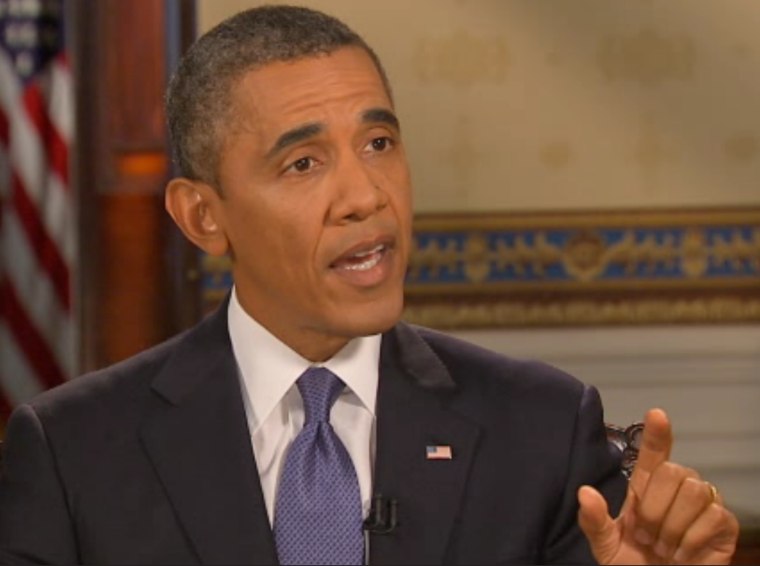Updated Sept. 10, 8:43 a.m.
President Obama called Russia's proposal to put Syrian chemical weapons under international control a possible "significant breakthrough," though he remained deeply skeptical of its chances for success.
"I think you have to take it with a grain of salt initially. But between the statements that we saw from the Russians--the statement today from the Syrians--this represents a potentially positive development," the president said Monday in an interview with NBC News’ Savannah Guthrie. "I think what we're seeing is that a credible threat of a military strike from the United States, supported potentially by a number of other countries around the world has given them pause and makes them consider whether or not they would make this move. And if they do, then this could potentially be a significant breakthrough. But we have to be skeptical because this is not how we've seen them operate over the last couple a years."
Russia’s unexpected proposal for its ally Syria to hand over its weapons stockpile to international authorities, and ultimately for disposal, gained support from a number in the international community who had otherwise been reluctant to support an American-led military strike on the Syrian government for its alleged use of chemical weapons. The United Nations Secretary General, Ban Ki-moon, and leaders in China, Germany, Britain--and even the New York Times editorial board--voiced support for the potential diplomatic solution. Sen. John McCain, one of the most outspoken proponents for a U.S. strike, told CNN "the fact is, you can't pass up this opportunity--if it is one."
Russia's Interfax News Agency reported Tuesday that the Syrian Foreign Minister Walid al-Moualem agreed to the proposal. "We held a very fruitful round of talks with Foreign Minister Sergey Lavrov...and in the evening we agreed to the Russian initiative," he is quoted as saying.
Obama, who sat down with a number of TV outlets Monday night as he continues to make his case for military action, told NBC News he hasn’t made up his mind on proceeding with military strike without congressional approval, but suggested the U.S. needs to be involved to some degree.
“I haven’t decided,” Obama said, adding that he takes the lawmakers’ vote “very seriously.”
"It’s my belief that for me, the president, to act without consensus in a situation where there’s not a direct, imminent threat to the homeland or our interests around the world, that that’s not the kind of precedent I want to set," he said.
As the Russian proposal picked up supporters as Monday wore on, Senate Majority Leader Harry Reid announced he would delay a Senate vote authorizing a strike that initially appeared poised to happen Wednesday.
Obama has been trying to persuade a weary American public that continues to poll against a U.S. strike, and hesitant lawmakers that military action is necessary to enforce the international pact against chemical weapons.
That reluctance even applies to the first lady: "If you ask Michelle, 'Do we want to be involved in another war?' The answer is no."
Obama admitted he can't say with confidence whether or not he will get the votes needed for a limited military authorization.
“Over the last four and a half years, I have shown great restraint when it comes to using military power. I know how tired the American people are of war generally and particularly war in the Middle East and so I don't take these decisions lightly,” he said. “But if we are going to have any kind of serious enforcement of this international ban on chemical weapons, then ultimately the United States has to be involved. And a credible threat may be what pushes the kind of political settlement that I think we'd all prefer."
Obama dismissed Syrian President Bashar al-Assad's threat to "expect everything" in retaliation of a possible U.S. strike: "Syria doesn't have significant capabilities to retaliate against us. Iran does. But Iran is not going to risk a war with the United States over this."
The White House has been trying to drum up support at home and abroad for limited action after new evidence point the finger at the Syrian government allegedly used chemical weapons on its own people. The attack on Aug. 21 killed nearly 1,500, including approximately 400 children outside Damascus.
Newly released videos show the apparent aftermath of a chemical attack on civilians. Obama said he was “heartbroken” after seeing this graphic footage and recommended “everyone look at these videos.”
The president will continue his public relations blitz Tuesday night in a formal address to the nation.
Read the full transcript here.
